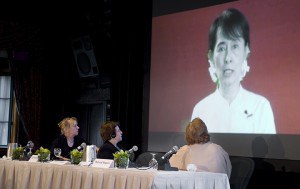Peace Laureates Take On the War on Women

Members of the Nobel Women's Initiative are marshaling their collective wisdom and experience to tackle the challenge of ending rape as a weapon of war.
Certain topics have always been hard to talk about—rape and sexual abuse ranking high up on that list. And yet we must speak up more because of the many women affected. According to conservative UN estimates, “worldwide, one in five women will become a victim of rape or attempted rape in her lifetime.” It is likely that sexual assault has happened to you, or to your friend, your mother, your daughter, your sister—the girl next to you in line at the grocery store, to scores of women reading these words right now. In too many cases, the secret lies buried deep within us for the rest of our lives.
But six women who are Nobel peace laureates want to not only break the silence but also to spearhead a global campaign to end rape. Who better to take on this challenge than this group who have individually overcome enormous odds? Nobel Peace Laureates Jody Williams, Shirin Ebadi, Wangari Maathai, Rigoberta Menchu Tum, Betty Williams and Mairead Maguire have already created a global organization to “work together for peace with justice and equality.” As part of this effort, the Nobel Women’s Initiative just released a report that finds that rape as a weapon of war is a crime occurring “on a massive scale” and is a threat to global peace and security. War on Women: Time for Action to End Sexual Violence in Conflict examines studies of sexual violence in five regions of the world, explores the leading causes of such heinous acts, assesses actions taken by the international community and offers some ways individuals and governments can move forward to end sexual violence.
“Waging war on the bodies of women has got to stop,” says Jody Williams, the 1997 recipient of the Nobel Peace Prize for her work to ban landmines. “Like any tactic of war, it can be eliminated.”
Rape is only one of many manifestations of the global pandemic of sexual violence—what some at the UN call a “global scourge”—that includes sexual slavery, forced prostitution, mutilation, as well as forced pregnancy and sterilization. Women may be targeted as members of a different tribe, to force their families off mineral-rich lands or to silence their voices raised to defend human rights. Whatever the reason, the scale and scope of the problem is growing. In places such as the Democratic Republic of Congo, Darfur, Rwanda, Bosnia and Burma, mass rapes have been used as a deliberate and strategic tactic of war—as an effective way to terrorize civilians and tear the basic fabric of society.
According to a report in May in the American Journal of Public Health, almost two million women and girls have been raped in the Congo, at an alarming rate of approximately 1,100 a day, 48 women every hour. In the 1990s, more than 500,000 women were raped in the Rwanda genocide, and some 40,000 during the war in Bosnia and Herzegovina. We should allow that information to go beyond our eyes and our brains and sink into our hearts, to feel the suffering of a girl as young as two months or a woman as old as eighty. These women may have been raped in front of family members, their bodies violated with broken glass bottles or rifles, leaving them permanently mutilated or pregnant or infected with HIV and other diseases. While the perpetrators rarely suffer any repercussions, the women are often sentenced to a lifetime of misery—ostracized by their communities and rarely getting the medical and psychological support they need.
To kick-start its effort to mobilize the world community, the Nobel Women’s Initiative organized a three-day international conference last month in Canada of more than 120 activists, academics, security experts and corporate leaders from some 36 countries. Participants at “Women Forging a New Security: Ending Sexual Violence in Conflict” shared ideas and developed strategies to join together as an organized movement, ending with a day of action, in which they called upon the public to pressure their elected officials to “take a stand.”(Readers are invited to take action at this link).

There is no single solution to stopping the use of sexual violence in conflict zones; it is entangled with many other thorny issues that face the world locally and internationally. However the peace laureates can speak with authority of non-violent means to resolve conflicts and to begin to look with an honest, open heart at its roots—at the cracks in the culture and the people in places where violence, and particularly sexual violence, thrives. How is it that human beings have grown so disconnected from each other, from our sense of compassion and empathy for the suffering of another human being, that such savage and brutal crimes can be routinely committed on such a grand scale?
This profoundly disturbing problem nevertheless offers the potential for hope and transformation, for the world community to, as Nobel Laureate Maguire Maguire puts it, “create a civilization with a heart.” Says Maguire, who won the peace prize in 1976 for her efforts to end violence in Ireland, “Sexual violence is not just happening in far away places, it is happening in our own homes. We need to recognize that this is not someone else’s problem but an issue to be faced by the whole human family. Working together, we can bring these horrific crimes to an end.”
For a collection of quotes from participants at the conference, click here.
More articles by Category: International, Violence against women
More articles by Tag: Africa, Rape



























